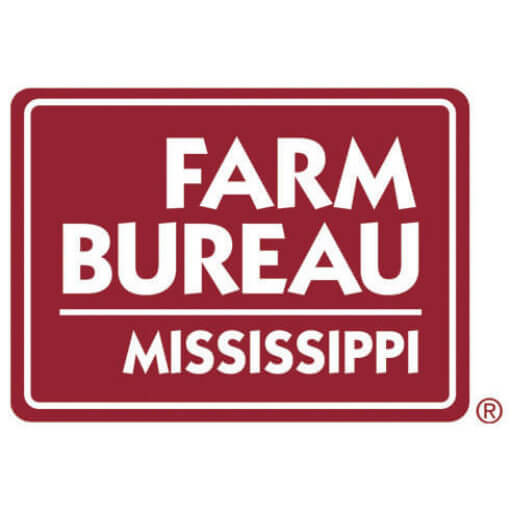For farmers, ranchers and rural Mississippians, weathering storms is a way of life. Storms bring high winds and heavy rains that destroy row after row of crops or cause floods to cover the precious soil needed to continue their way of life.
Farmers are accustomed to dealing with natural disasters. However, over the last several years, they have been dealt man-made storms that are just as bad, if not worse. Lower commodity prices, trade wars, and a worldwide pandemic, are enough to make you want to call it a day and move on with life. But, that’s not how farmers live. They are stronger as one and the Mississippi Farm Bureau Federation is stronger as an organization because of its members.
During the 2020 Mississippi Legislative Session, MFBF worked to advance bills that help farmers, while blocking measures with unintended negative impacts on agriculture. Here are a few efforts MFBF supported this year.
COVID-19
The Mississippi Legislature halted the 2020 Mississippi Legislative Session for several weeks and then extended it due to the COVID-19 pandemic. Around mid-March, at the advice of State Health Officer Dr. Thomas Dobbs, the Mississippi Legislature took a hiatus. Once the Legislature returned to Jackson, the first priority was allocating $300 million of federal CARES funds for Mississippi small business relief due to COVID-19 related interruptions. The House and Senate completed a budget for the new fiscal year beginning July 1 and voted on the remaining general bills left on the calendar.
Mississippi Electric Cooperatives Broadband COVID-19 Act
During the last week of the session, the Mississippi Legislature appropriated a portion of the state’s remaining $1.25 billion in federal CARES funding to rural broadband. The Mississippi Electric Cooperatives Broadband COVID-19 Act placed $65 million in grant funds for electric cooperatives willing to bring connectivity to rural Mississippi and match the funds dollar for dollar. The Mississippi Legislature allotted the remaining $10 million to broadband providers willing to connect rural Mississippi. This legislation is a huge win for the rural communities in our state, as it will assist with distance learning, telemedicine, precision agriculture, and the overall quality of life. The Mississippi Farm Bureau Federation supported the plan presented by the Electric Cooperatives of Mississippi to bring high-speed internet to the state. Thank you to Sen. Joel Carter and Rep. Scott Bounds for their work on this measure.
Mississippi Back-to-Business Liability Assurance and Health Care Emergency Response Liability Act
MFBF also supported the Mississippi Back-to-Business Liability Assurance and Health Care Emergency Response Liability Protection Act. This legislation protects employers, manufacturers and small business owners from frivolous COVID-19 lawsuits. This protection will allow the state’s economy to move forward.
Uniform Partition of Heirs Property Act
Congress placed a provision in the 2018 Farm Bill allowing farmers utilizing heir property, or property held by tenancy in common by heirs without clear agreement as to ownership, to receive a farm number allowing participation in Farm Service Agency and United States Department of Agriculture programs if their state passed the Uniform Partition of Heirs Property Act. The Uniform Law Commission introduced this model legislation several years ago to solve problems surrounding heir property and how to partition or obtain clear title to the property. Several states have passed this law, and this year, the Mississippi Farm Bureau Federation supported the passage in Mississippi. Gov. Tate Reeves signed the bill on July 1. This law will help protect landowner rights and allow more Mississippi farmers to participate in federal agricultural programs. It will also help smaller farmers and minority farmers keep the family farm. Senators Barbara Blackmon and David Blount and Representatives Jarvis Dortch, Nick Bain and Ed Blackmon were all instrumental in the passage of this bill.
Livestock Liability Bill
Prior to 2020, Mississippi was the only state in the Southeast placing the burden on a livestock owner to prove he or she was not negligent if a vehicle hit their livestock on a state or federal highway. This was also one of the only instances, if not the only place in state law, where a plaintiff did not have to prove negligence. Further, the law was inconsistent. If a driver hit livestock on a county road, their case was just like any other plaintiff’s case, as they would have to prove negligence. This year, the Mississippi Farm Bureau Federation supported the Mississippi Cattlemen’s Association’s work to change Mississippi’s law, deleting the burden from a livestock owner to prove they were not negligent at the outset. The bill received a great deal of support on both sides of the Capitol, and was signed into law.
Farmers can now graze livestock without the fear of having to overcome an unfair burden in court. Rep. Price Wallace, the bill’s author, worked tirelessly to get this legislation across the finish line. There was also a great deal of help on the Senate side from Sen. Chris McDaniel.
Land Grant Funding
One of the Mississippi Farm Bureau Federation’s priorities each year is to secure adequate funding for Mississippi’s Land Grant Universities – Mississippi State University and Alcorn State University. The economic downturn caused by COVID-19 did not spare Mississippi. Though there were originally talks of 12% budget cuts across the board, the ag units at the land grant universities took less than a 3.5% reduction. MFBF appreciates the appropriations chairs, Sen. Briggs Hopson and Rep. John Read, IHL subcommittee chairs, Sen. Jenifer Branning and Rep. Jim Beckett, and the entire Legislature for seeing the importance of Extension, experiment stations, Mississippi State University’s School of Veterinary Medicine, and the colleges of agriculture and forestry to Mississippi’s farmers and ranchers. MFBF worked closely with Mississippi State University to educate legislators on the day-to-day impact ag units have on our membership and their livelihoods.
Future of Mississippi Agriculture Bill
Commissioner of Agriculture and Commerce Andy Gipson requested several actions be taken in the Future of Mississippi Agriculture Bill. The Mississippi Department of Agriculture and Commerce’s omnibus bill went through several iterations before Gov. Tate Reeves sighed it into law. The bill allows MDAC to work with producers on nuisance animal control, increases the number of agricultural theft investigators throughout the state, and works to protect the Mississippi Fairgrounds from the financial impacts cause by COVID-19.
Hemp Cultivation Act
During the 2019 policy process, Mississippi Farm Bureau Federation members created policy supporting the legalization of the cultivation of industrial hemp in Mississippi. The 2020 Hemp Cultivation Act of the Mississippi Legislature did just that. Farmers can now legally grow Hemp in the state with a United States Department of Agriculture permit and by working with the Mississippi Department of Agriculture.
Industrial Hemp is differentiated from marijuana in that it has less than 0.03% THC. Industrial Hemp is grown in 48 other states for fiber and CBD oil.
Marketplace Facilitator Act
Since individuals have been able to purchase products online, they were required to pay sales tax when they filed their taxes in the spring. The U.S. Supreme Court case, Quill, seemed to disallow online retailers from charging sales tax on the front end. Since ordering online has changed drastically since the days of mail order catalogs, the U.S. Supreme Court recently ruled differently. Amazon and other large retailers started collecting sales tax after this decision, but were unable to collect sales tax on third party vendors in Mississippi, until now. This year, the Mississippi Legislature passed the Marketplace Facilitator Act, which allows retailers to collect sales tax from third party sellers on their platforms.
This will allow more funds to go toward cities, counties, and the Local System Bridge Program. In turn, this helps keep property taxes from increasing at the local level. Some would argue this is a tax increase, but it actually closes the loophole some taxpayers have used for years.
Sales Tax Fix for Loggers
Until recently, loggers could purchase a “knuckle boom” at a reduced sales tax rate, because it was considered a farm implement. The Mississippi Department of Revenue voiced concern that this sales tax rate reduction may need clarification, as it related to one piece of equipment. The Mississippi Farm Bureau Federation supported the Mississippi Forestry Association’s work to clarify that “knuckle booms” do receive a lower sales tax rate.
Logging Equipment Hauling Permits
The Mississippi Legislature worked on a bill to help loggers reduce paperwork. When hauled, some logging equipment can create an overweight load. In the past, loggers would request a special permit every time they wanted to haul equipment. This legislation will allow them to request an annual permit for hauling equipment. The Mississippi Farm Bureau Federation supported the Mississippi Loggers Association in their work on the bill.
Change is Constant
Even though the statewide election for members of the Mississippi Legislature occurred less than a year ago, several individuals have already resigned, causing special elections to be scheduled in the fall and bringing new faces to the Mississippi Capitol in the interim.
House District 88 Rep. Ramona Blackledge, who represented Jones and Jasper counties, also resigned early. Rep. Robin Robinson, a former leader at Sanderson Farms and MEC, won the special election to fill her seat. House District 87 Rep. Billy Andrews, who represented Forrest and Lamar counties resigned early. House District 37 Rep. Gary Chism, who represented Clay, Lowndes and Oktibbeha counties, and House District 66 Rep. Jarvis Dortch, who represented Hinds County, resigned later.
Senate District 15 Sen. Gary Jackson, who represented Choctaw, Montgomery, Oktibbeha and Webster counties, resigned effective June 30. Sen. Sally Doty was appointed to lead the Public Utilities Staff, opening up her senate seat in District 39, which represents Lincoln, Copiah, Lawrence and Walthall counties. These resignations and appointments mean five special elections will be held this fall.
Mississippi Department of Revenue Commissioner Herb Frierson, the state’s lead tax collector, retired after forty years in state government. Gov. Tate Reeves appointed Chris Graham, who has a successful history in Mississippi government, to replace him.
Thank You
The Mississippi Farm Bureau Federation thanks Gov. Tate Reeves, Lt. Gov. Delbert Hosemann, Speaker Philip Gunn and their staffs for their friendliness toward agricultural issue. We would also like to thank the Senate and House of Representatives Judiciary A chairwomen, Sen. Sally Doty and Rep. Angela Cockerham, on their outstanding work for rural Mississippi throughout the 2020 session. As the largest general farm organization in the state, MFBF gets to work with multiple agriculture organizations, including the Mississippi Cattlemen’s Association, Delta Council, Mississippi Forestry Association, Mississippi Poultry Association, Mississippi Loggers Association, Duck’s Unlimited, U.S. Catfish and the Farm Credit System. We appreciate their teamwork throughout the 2020 session. In addition, we would like to thank the Senate and House Agriculture Committee Chairs, Sen. Chuck Younger and Rep. Bill Pigott, and the Vice Chairs, Sen. Ben Suber and Rep. Vince Mangold. They were always open to hear MFBF’s concerns.
Lee Thorne is the Public Policy Coordinator at the Mississippi Farm Bureau Federation.

